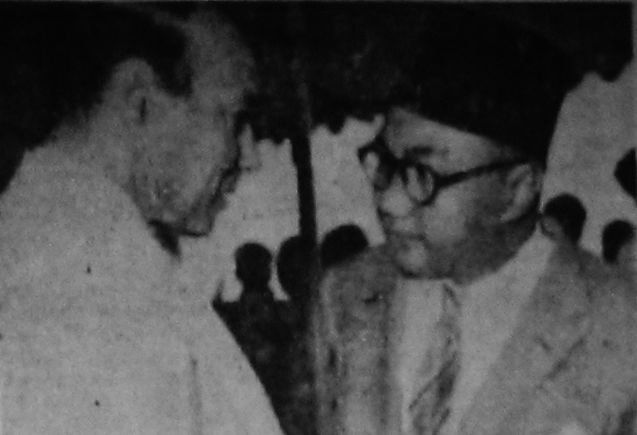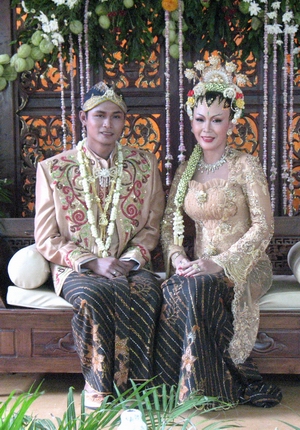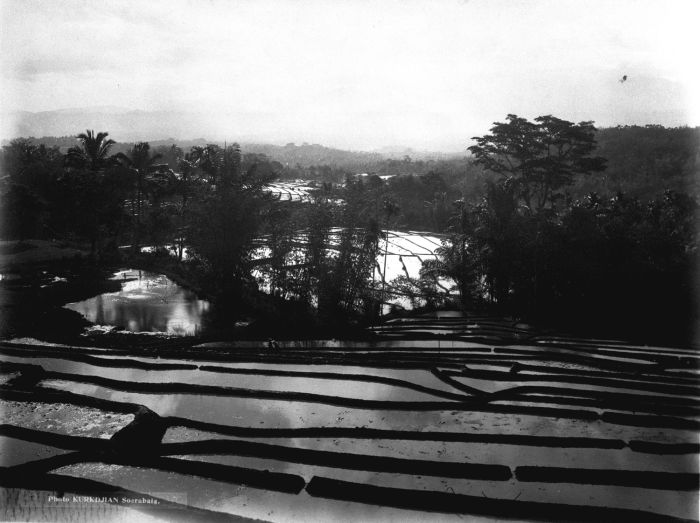|
Ruslan Abdulgani
Ruslan Abdulgani (November 24, 1914, Surabaya — June 29, 2005, Jakarta, his first name is also spelled Roeslan) was an Indonesian government official and diplomat known for his role as a leader during the Indonesian National Revolution in the late 1940s, and as a key minister and United Nations ambassador in the Sukarno government during the 1950s and 1960s. Roeslan was born and raised in Surabaya, East Java. He came from an upper-middle-class family; his father was a neighborhood shopkeeper and owned a small fleet of taxis. His mother, his father's second wife, was a religious tutor, giving reading and religion lessons from the Qur'an. According to a memoir of his childhood, which Roeslan wrote in the 1970s, his mother was also a strong Javanese nationalist, and it was from her that he first learned about Dutch colonial rule and the possibility of independence. During the Indonesian fight for independence from the Dutch in the late 1940s, Roeslan was a key lieutenant u ... [...More Info...] [...Related Items...] OR: [Wikipedia] [Google] [Baidu] |
Mohammad Yamin
Mohammad Yamin (24 August 1903 – 17 October 1962) was an Indonesians, Indonesian poet, politician and National Hero of Indonesia, national hero who played a key role in the writing of the draft preamble to the Constitution of Indonesia, 1945 constitution. Early life and education Yamin was born on 28 August 1903 in Talawi, Sawahlunto on the island of Sumatra, Indonesia. He was educated at Dutch schools for natives, firstly at a Hollandsch-Inlandsche School, then at a Algemene Middelbare School in Yogyakarta. In 1932 he obtained a law degree in Jakarta. In the early 1930s, Yamin was active in journalist circles, joining the editorial board of the newspaper ''Panorama'', together with Liem Koen Hian, Sanusi Pane and Amir Sjarifuddin. In mid-1936, together with his colleagues Liem, Pane and Sjarifuddin, Yamin started another newspaper, ''Kebangoenan'' (1936–1941), which—as with ''Panorama''—was published by Phoa Liong Gie's Siang Po Printing Press. Literary legacy Yamin be ... [...More Info...] [...Related Items...] OR: [Wikipedia] [Google] [Baidu] |
Javanese People
The Javanese ( id, Orang Jawa; jv, ꦮꦺꦴꦁꦗꦮ, ''Wong Jawa'' ; , ''Tiyang Jawi'' ) are an ethnic group native to the central and eastern part of the Indonesian island of Java. With approximately 100 million people, Javanese people are the largest ethnic group in Indonesia and the whole Southeast Asia in general. Their native language is Javanese, it is the largest of the Austronesian languages in number of native speakers and also the largest regional language in Southeast Asia. The Javanese as the largest ethnic group in the region have dominated the historical, social, and political landscape in the past as well as in modern Indonesia and Southeast Asia. There are significant numbers of Javanese diaspora outside of central and eastern Java regions, including the other provinces of Indonesia, and also in another countries such as Suriname, Singapore, Malaysia, Egypt, Saudi Arabia, South Africa, Sri Lanka, Yemen and the Netherlands. The Javanese ethnic group h ... [...More Info...] [...Related Items...] OR: [Wikipedia] [Google] [Baidu] |
Political Corruption
Political corruption is the use of powers by government officials or their network contacts for illegitimate private gain. Forms of corruption vary, but can include bribery, lobbying, extortion, cronyism, nepotism, parochialism, patronage, influence peddling, graft, and embezzlement. Corruption may facilitate criminal enterprise such as drug trafficking, money laundering, and human trafficking, though it is not restricted to these activities. Misuse of government power for other purposes, such as repression of political opponents and general police brutality, is also considered political corruption. Over time, corruption has been defined differently. For example, in a simple context, while performing work for a government or as a representative, it is unethical to accept a gift. Any free gift could be construed as a scheme to lure the recipient towards some biases. In most cases, the gift is seen as an intention to seek certain favors such as work promotion, tipping in or ... [...More Info...] [...Related Items...] OR: [Wikipedia] [Google] [Baidu] |
West Java
West Java ( id, Jawa Barat, su, ᮏᮝ ᮊᮥᮜᮧᮔ᮪, romanized ''Jawa Kulon'') is a province of Indonesia on the western part of the island of Java, with its provincial capital in Bandung. West Java is bordered by the province of Banten and the country's capital region of Jakarta to the west, the Java Sea to the north, the province of Central Java to the east and the Indian Ocean to the south. With Banten, this province is the native homeland of the Sundanese people, the second-largest ethnic group in Indonesia. West Java was one of the first eight provinces of Indonesia formed following the country's independence proclamation and was later legally re-established on 14 July 1950. In 1966, the city of Jakarta was split off from West Java as a 'special capital region' (), with a status equivalent to that of a province, while in 2000 the western parts of the province were in turn split away to form a separate Banten province. Even following these split-offs, West Java is ... [...More Info...] [...Related Items...] OR: [Wikipedia] [Google] [Baidu] |
Indonesian Military
, founded = as the ('People's Security Forces') , current_form = , disbanded = , branches = , headquarters = Cilangkap, Jakarta , website = , commander-in-chief = Joko Widodo , commander-in-chief_title = Commander-in-Chief , chief minister = Mahfud MD , chief minister_title = Coordinating Minister for Political, Legal, and Security Affairs , minister = Lt. Gen. (ret.) Prabowo Subianto , minister_title = Minister of Defence , commander = Admiral Yudo Margono , commander_title = Commander of the Armed Forces , age = 17 , conscription = No , manpower_data = 2016 , manpower_age = , available = 131,000,000 , available_f = , fit = 108,000,000 , fit_f = , reaching = 4,500,000 , reaching_f = , active = 400,000 , ranked = 13th , reserve ... [...More Info...] [...Related Items...] OR: [Wikipedia] [Google] [Baidu] |
Minister Of Information
An information minister (also called minister of information) is a position in the governments of some countries responsible for dealing with information matters; it is often linked with censorship and propaganda. Sometimes the position is given to a separate Minister of Culture. Information ministries by country *: Ministry of Information *: Director of Information Services *: Ministry of Information and Broadcasting *: Ministry of Communication and Information Technology *: Ministry of Information (Lebanon) *: Minister of Communications and Multimedia (Malaysia) *: Minister of Information and Communication Technology *: Minister of Information and Communications *: Ministry of Information Society and Administration *: Information Minister *: Presidential Communications Group (Philippines) *: Minister of Culture and Information *: Ministry of Information (Serbia) *: Minister of Information, Communications and the Arts *: Ministry of Science and ICT *: Minister of Inform ... [...More Info...] [...Related Items...] OR: [Wikipedia] [Google] [Baidu] |
Supreme Advisory Council (Indonesia)
The Supreme Advisory Council ( id, Dewan Pertimbangan Agung, DPA), was an advisory council for the President of Indonesia which existed from 1945 to 2003, with a brief interruption from 1950 to 1959. Largely composed of senior and retired government figures, the DPA was generally regarded as powerless. Its functions were limited to offering proposals to the government on matters of national importance as well as opinions on matters raised by the president. The DPA was replaced by the Presidential Advisory Council in 2003. Background There was no credible source about the background of the council's formation when it was embodied in the Constitution of Indonesia. In the supplement of the constitution, the council was compared to a council of state, leading to possibility that the council was based on the in the Dutch East Indies. In the founding fathers of Indonesia itself, there was an opinion that the council was based on the village traditions in Indonesia, on which the vill ... [...More Info...] [...Related Items...] OR: [Wikipedia] [Google] [Baidu] |
Superpower
A superpower is a state with a dominant position characterized by its extensive ability to exert influence or project power on a global scale. This is done through the combined means of economic, military, technological, political and cultural strength as well as diplomatic and soft power influence. Traditionally, superpowers are preeminent among the great powers. While a great power state is capable of exerting its influence globally, superpowers are states so influential that no significant action can be taken by the global community without first considering the positions of the superpowers on the issue. The term was first applied in 1944 during World War II to the United States, the United Kingdom, and the Soviet Union. During the Cold War, the British Empire dissolved, leaving the United States and the Soviet Union to dominate world affairs. At the end of the Cold War and the dissolution of the Soviet Union in 1991, the United States became the world's sole superpower. ... [...More Info...] [...Related Items...] OR: [Wikipedia] [Google] [Baidu] |
Cold War
The Cold War is a term commonly used to refer to a period of geopolitical tension between the United States and the Soviet Union and their respective allies, the Western Bloc and the Eastern Bloc. The term '' cold war'' is used because there was no large-scale fighting directly between the two superpowers, but they each supported major regional conflicts known as proxy wars. The conflict was based around the ideological and geopolitical struggle for global influence by these two superpowers, following their temporary alliance and victory against Nazi Germany and Imperial Japan in 1945. Aside from the nuclear arsenal development and conventional military deployment, the struggle for dominance was expressed via indirect means such as psychological warfare, propaganda campaigns, espionage, far-reaching embargoes, rivalry at sports events, and technological competitions such as the Space Race. The Western Bloc was led by the United States as well as a number of other First W ... [...More Info...] [...Related Items...] OR: [Wikipedia] [Google] [Baidu] |
Non-Aligned Movement
The Non-Aligned Movement (NAM) is a forum of 120 countries that are not formally aligned with or against any major power bloc. After the United Nations, it is the largest grouping of states worldwide. The movement originated in the aftermath of the Korean War, as an effort by some countries to counterbalance the rapid bi- polarization of the world during the Cold War, whereby two major powers formed blocs and embarked on a policy to pull the rest of the world into their orbits. One of these was the pro-Soviet, communist bloc whose best known alliance was the Warsaw Pact, and the other the pro-American capitalist group of countries many of which belonged to NATO. In 1961, drawing on the principles agreed at the Bandung Conference of 1955, the Non-Aligned Movement was formally established in Belgrade, Yugoslavia, through an initiative of Yugoslav President Josip Broz Tito, Indian Prime Minister Jawaharlal Nehru, Egyptian President Gamal Abdel Nasser, Ghanaian President Kwame N ... [...More Info...] [...Related Items...] OR: [Wikipedia] [Google] [Baidu] |
Asia-Africa Conference
The first large-scale Asian–African or Afro–Asian Conference ( id, Konferensi Asia–Afrika)—also known as the Bandung Conference—was a meeting of Asian and African states, most of which were newly independent, which took place on 18–24 April 1955 in Bandung, West Java, Indonesia. The twenty-nine countries that participated represented a total population of 1.5 billion people, 54% of the world's population. The conference was organized by Indonesia, Burma (Myanmar), India, Ceylon (Sri Lanka), and Pakistan and was coordinated by Ruslan Abdulgani, secretary general of the Ministry of Foreign Affairs of the Republic of Indonesia. The conference's stated aims were to promote Afro-Asian economic and cultural cooperation and to oppose colonialism or neocolonialism by any nation. The conference was an important step towards the eventual creation of the Non-Aligned Movement yet the two initiatives ran in parallel during the 1960s, even coming in confrontation with one another ... [...More Info...] [...Related Items...] OR: [Wikipedia] [Google] [Baidu] |
Anti-imperialist
Anti-imperialism in political science and international relations is a term used in a variety of contexts, usually by nationalist movements who want to secede from a larger polity (usually in the form of an empire, but also in a multi-ethnic sovereign state) or as a specific theory opposed to capitalism in Leninist discourse, derived from Vladimir Lenin's work ''Imperialism, the Highest Stage of Capitalism''. Less common usage refers to opponents of an interventionist foreign policy. People who categorize themselves as anti-imperialists often state that they are opposed to colonialism, colonial empires, hegemony, imperialism and the territorial expansion of a country beyond its established borders. An influential movement independent of the Western Left that advocated religious anti-imperialism was Pan-Islamism; which challenged the Western civilisational model and rose to prominence across various parts of the Islamic World during the 19th and 20th centuries. It's most influe ... [...More Info...] [...Related Items...] OR: [Wikipedia] [Google] [Baidu] |





.png)

